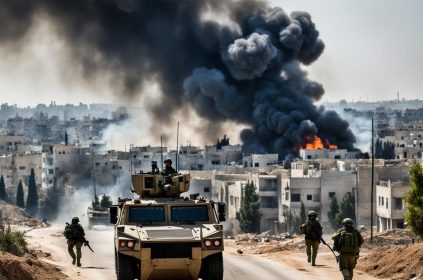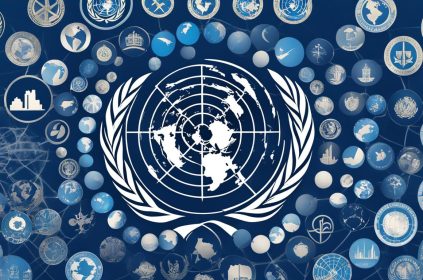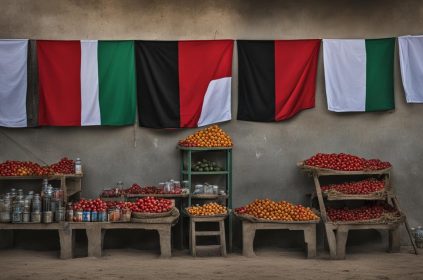The Middle East crisis is a complex issue characterized by political instability and regional conflict. It has far-reaching implications for the international community and has been a longstanding challenge to achieving peace in the region. The ongoing conflict stems from various factors, including the Israeli occupation of Palestine, the radical Israeli government, and the ineffective Palestinian leadership.
At the heart of the crisis is the lack of a viable political horizon and the absence of meaningful peace initiatives. The Israeli occupation of Palestine has fueled deep-seated unrest and violence, exacerbating the already fragile situation. The current state of affairs is compounded by a disinterested U.S. administration, making it challenging to facilitate a political breakthrough.
Efforts to address the Middle East crisis require a willingness from both parties involved and strong leadership, particularly from the United States. The international community must recognize its shared responsibility in finding a lasting solution and take proactive measures to promote peace and stability in the region.
Key Takeaways:
- The Middle East crisis is characterized by political instability and regional conflict.
- The Israeli occupation of Palestine contributes to ongoing unrest and violence.
- The lack of a viable political horizon hinders progress towards peace.
- Strong U.S. leadership and international involvement are crucial in resolving the crisis.
- Efforts to achieve peace require willingness from all parties and a focus on political breakthroughs.
The Root Causes of the Middle East Crisis
The ongoing Middle East crisis is rooted in the Israeli occupation of Palestine, which has resulted in decades of political instability and the absence of a political horizon. The Israeli occupation has created a deep sense of resentment and frustration among Palestinians, fueling unrest and resistance. Palestinians in Gaza, in particular, have been living under a severe blockade, cut off from the rest of the world and facing limited access to essential resources.
The lack of a political solution and the focus on other regional developments, such as the Abraham Accords, has further exacerbated the crisis. The neglect of the Palestinian issue has led to a growing sense of hopelessness and despair among Palestinians, as they feel marginalized and overlooked in the pursuit of other geopolitical interests.
In order to address the Middle East crisis effectively, it is crucial to acknowledge and address the root causes, primarily the Israeli occupation of Palestine. Without a genuine commitment to finding a political solution and creating a viable political horizon for Palestinians, the crisis will continue to escalate, with far-reaching implications for regional stability and global security.
The Impacts of the Middle East Crisis on Palestine
The ongoing Middle East crisis has had severe impacts on Palestine, particularly in the Gaza Strip. Palestinians in Gaza have been subjected to forced displacement, military occupation, and isolation from the outside world. The recent surge in violence and the possibility of an Israeli ground operation further exacerbate concerns about the future of Palestinians in Gaza.
The occupation has resulted in the destruction of infrastructure, homes, and vital services, leaving the population in dire conditions. The Israeli blockade has limited access to essential resources, including food, water, and medical supplies, causing a humanitarian crisis. The lack of freedom of movement and economic opportunities has contributed to high unemployment rates and widespread poverty.
The Middle East crisis has also impacted the Palestinian Authority, which faces challenges in the West Bank. The recent violence and the reluctance of the Palestinian Authority to be associated with it have strained relationships with the international community, affecting diplomatic efforts and aid support. The situation poses significant challenges for the Palestinian leadership in asserting their authority and addressing the needs of the population.
| Impact | Gaza | Palestinian Authority |
|---|---|---|
| Forced Displacement | Significant number of Palestinians displaced from their homes | N/A |
| Military Occupation | Continuous presence of Israeli military forces in Gaza | N/A |
| Isolation | Restrictions on movement and limited access to the outside world | N/A |
| Destruction of Infrastructure | Homes, schools, hospitals, and vital services severely damaged | N/A |
| Humanitarian Crisis | Limited access to food, water, medical supplies | N/A |
| Poverty and Unemployment | High poverty rates and unemployment | N/A |
| Challenges for Palestinian Authority | N/A | Strained relationships with the international community, limited diplomatic efforts |
The impacts of the Middle East crisis on Palestine, particularly in Gaza, are far-reaching and have resulted in ongoing suffering for the population. Addressing these impacts and finding a comprehensive solution that respects the rights and aspirations of both Israelis and Palestinians remains a daunting challenge.
The Regional Repercussions of the Middle East Crisis
The Middle East crisis has far-reaching regional repercussions that demand attention and action from the international community. While history has shown that crises of this magnitude can lead to political breakthroughs, the current situation is further complicated by the presence of a radical Israeli government, an ineffective Palestinian leadership, and a disinterested U.S. administration.
The region is at a critical juncture, with the potential for significant changes in power dynamics and alliances. The ongoing crisis poses a threat not only to regional stability but also to global security. The Middle East has long been a hotspot for political tensions, and the current crisis has the potential to escalate into further conflicts.
The involvement of external actors and the influence of geopolitical interests add layers of complexity to the already volatile situation. The region is witnessing increased interference from regional and global powers, including Iran, Saudi Arabia, and the United States. These players are vying for influence and control, exacerbating existing tensions and further fragmenting the region.
| Repercussions of Middle East Crisis | Impact |
|---|---|
| Political Breakthroughs | The crisis could potentially pave the way for renewed peace initiatives and political breakthroughs, as seen in the past with the Egypt-Israel peace agreement. |
| Radical Israeli Government | The presence of a radical Israeli government complicates the prospects for a peaceful resolution and exacerbates tensions with neighboring countries. |
| U.S. Administration | The disinterested stance of the U.S. administration hinders effective diplomatic engagement and undermines efforts to find a solution. |
“The Middle East crisis is a high-stakes situation with implications that extend far beyond the region. It requires a collective effort from the international community to address the root causes, promote dialogue, and work towards a sustainable resolution.”
Given the complexity of the Middle East crisis, there is a need for comprehensive and coordinated efforts to de-escalate tensions and foster a conducive environment for peace. The international community must play an active role in facilitating negotiations, supporting regional stability, and addressing the underlying issues fueling the crisis. Only through collective action can the region move towards a more peaceful and prosperous future.
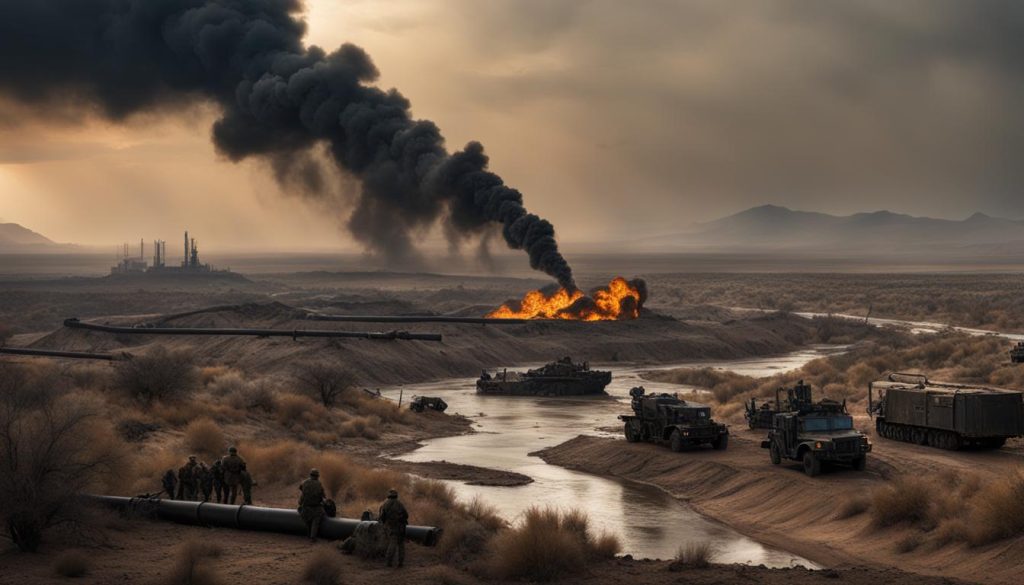
Evaluating the Economic Impact of the Middle East Crisis
The ongoing Middle East crisis has the potential to impact the global economy and financial markets in various ways. As the situation continues to evolve, it is crucial to assess the potential economic consequences and understand how they may affect different sectors and stakeholders.
Economic Implications
- The crisis may have implications for natural resources, particularly oil production and supply. Currently, the conflict does not significantly impact oil production or supply, but an escalation could lead to disruptions in important shipping routes in the region.
- Corporate profits may also be affected by the crisis, as political instability and regional conflict can create uncertainty and hinder business operations.
- Inflation is another factor to consider. While it is difficult to predict the exact impact, geopolitical tensions and supply chain disruptions could potentially contribute to higher inflation rates.
- Consumer sentiment may be influenced by the crisis, as individuals may become more cautious about spending and investing due to the uncertainty and potential economic consequences.
It is important for businesses, investors, and policymakers to closely monitor the situation and adapt their strategies accordingly. By staying informed about the geopolitical dynamics and potential economic impacts, stakeholders can make more informed decisions and mitigate risks.
| Economic Factors | Potential Impact |
|---|---|
| Natural resources | Disruptions in shipping routes |
| Corporate profits | Uncertainty and hindered operations |
| Inflation | Potential increase due to geopolitical tensions and supply chain disruptions |
| Consumer sentiment | Cautious spending and investing due to uncertainty |
“The ongoing Middle East crisis poses economic risks and uncertainties. Businesses and investors should carefully assess the potential impact on natural resources, corporate profits, inflation, and consumer sentiment.” – Economic Analyst
It is important to note that the economic impact of the Middle East crisis is subject to change based on the evolving geopolitical landscape and the actions of relevant stakeholders. The interconnectedness of the global economy means that disruptions in one region can have ripple effects around the world. Therefore, comprehensive analysis and ongoing monitoring are essential to gauge the true extent of the economic consequences.
Assessing Investment Opportunities Amid the Middle East Crisis
While the Middle East crisis continues to pose challenges and uncertainties, it is important for investors to evaluate the potential investment opportunities that may arise in the midst of this geopolitical turmoil. Market volatility may be expected in the short term, but it is crucial to remember that geopolitical crises generally have not had a lasting impact on financial markets. Therefore, maintaining a long-term perspective and staying invested in a diversified, goals-aligned portfolio is key.
Amidst the Middle East crisis, the global economy presents several positive indicators that can provide opportunities for investors. Factors such as sticky inflation, strong labor markets, resilient corporate America, and ongoing fiscal spending efforts can contribute to the growth potential of equities. Additionally, fixed income investments can serve as a way to mitigate uncertainty and provide stability to investment portfolios.
When evaluating investment opportunities, it is important to carefully consider both the geopolitical risks associated with the Middle East crisis and the underlying fundamentals of the market. A thorough analysis of the potential impact of the crisis on the global economy and financial markets is essential for making informed investment decisions. By focusing on the long-term prospects and aligning investment strategies with market fundamentals, investors can position themselves to navigate the challenges and seize opportunities in the midst of the Middle East crisis.

Evaluating Geopolitical Risks
When assessing investment opportunities amid the Middle East crisis, it is important to carefully evaluate the geopolitical risks involved. Understanding the potential implications of the crisis on regional stability, alliances, and conflicts can provide valuable insights for investors. By staying informed about the evolving geopolitical landscape and its potential impact on the global economy, investors can make more informed decisions and adjust their portfolios accordingly.
The Geopolitical Landscape in the Middle East
The Middle East crisis has brought about significant changes in the geopolitical landscape of the region. Various alliances and conflicts have emerged, shaping the dynamics and creating implications on multiple fronts. One notable alliance is forming between Hamas, Hezbollah, and Iran, which seeks to increase their power in the region.
On the other hand, Israel is actively working to keep Iran out of public speeches, highlighting the concern over Iran’s influence in the Middle East. Additionally, there is a growing bloc formation in the west, with armies coming from the east, further complicating the situation and adding to the intricacies of the conflict.
The involvement of Iran in the Middle East crisis adds another layer of complexity, with potential regional implications. Iran’s actions and influence have the potential to further escalate the conflict and impact the delicate balance of power in the region. As tensions continue to rise, it becomes crucial to closely monitor the actions and motivations of all parties involved.
“The Middle East crisis has transformed the geopolitical landscape, with alliances and conflicts redefining the power dynamics in the region.”
The intensifying alliances, conflicts, and power struggles highlight the fragile state of affairs in the Middle East. The repercussions of these evolving geopolitical relationships will have significant consequences for the region’s stability and future. It is imperative for the international community to closely observe and engage in a diplomatic dialogue to mitigate the risks and work towards a peaceful resolution.
| Alliances | Conflicts |
|---|---|
| Hamas – Hezbollah – Iran | Israeli-Palestinian conflict |
| Western blocs | Power struggles within the region |
The Role of Israel in the End Times
According to some interpretations of biblical concepts, the ongoing conflicts in the Middle East, including the Middle East crisis, are seen as signs of the approaching end times. Israel, in particular, is believed to play a significant role in this eschatological narrative. These events are likened to birth pains, symbolizing the culmination of events before a new era.
“And you will hear of wars and rumors of wars. See that you are not alarmed, for this must take place, but the end is not yet. For nation will rise against nation, and kingdom against kingdom, and there will be famines and earthquakes in various places.” – Matthew 24:6-7
Within this framework, the Middle East crisis can be seen as part of the broader context of biblical prophecies. It is important to note that these interpretations are subjective and vary among different religious and theological perspectives.
The Birth Pains of the End Times
The concept of “birth pains” is often used in biblical texts to symbolize the increasing intensity and frequency of global events leading up to the end times. It suggests that just as labor pains become more intense and frequent as a woman approaches childbirth, so too will global upheavals increase in the lead-up to the final culmination of events.
While the concept of birth pains should be approached with caution and not taken as a specific timeline or prediction, it serves as a metaphorical framework for understanding the turbulent times that may be part of a larger divine plan. It invites reflection and contemplation on the significance of ongoing conflicts, such as the Middle East crisis, within a spiritual context.
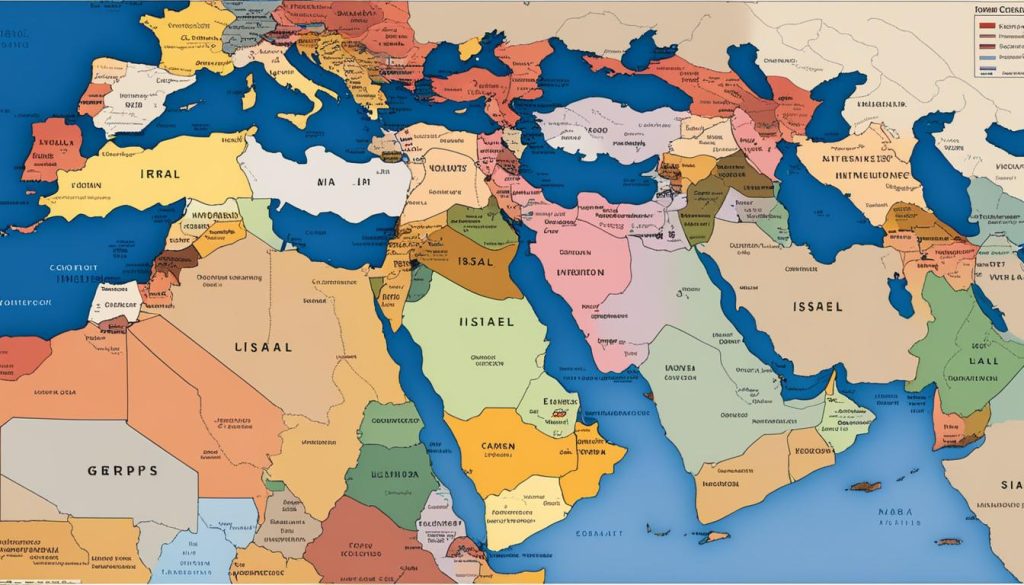
The Impact of Current Events on the End Times
Current events, including the Middle East crisis and the COVID-19 pandemic, are seen by some as signs of the approaching end times. The feeling of danger is increasing, and there is a belief that these events align with biblical prophecies. The connection between the conflicts and biblical concepts adds another layer of interpretation to the ongoing crisis.
The Middle East crisis, with its political instability and regional conflict, has created a sense of urgency among believers who view it through the lens of biblical concepts and end times prophecies. The ongoing conflicts between Israel and Palestine, the alliances being formed, and the power struggles in the region are considered significant indicators of the approaching end times.
The COVID-19 pandemic, with its global impact and disruption of daily life, has further fueled speculations about the end times. The pandemic’s widespread effects have led many to question the fragility of our world and consider it as a sign of the imminent apocalyptic events described in religious texts.
| Event | Relevance to End Times |
|---|---|
| Middle East Crisis | Believed to align with biblical prophecies and indicate approaching end times. |
| COVID-19 Pandemic | Viewed as a global event with apocalyptic implications, prompting discussions about end times. |
It is important to note that interpretations of these events in relation to the end times vary among different religious and cultural perspectives. While some see a direct correlation between current events and biblical prophecies, others may perceive them differently. Nonetheless, the unfolding Middle East crisis and the global impact of the COVID-19 pandemic have undeniably heightened conversations and contemplations surrounding the end times.
Alliances and Conflicts in the Middle East
The Middle East crisis has sparked the formation of various alliances and conflicts within the region. These geopolitical power struggles involve multiple actors, including Hamas, Hezbollah, Iran, and Israel. Each party has its own interests and objectives, leading to complex dynamics that contribute to the ongoing tensions and instability in the Middle East.
One notable alliance is between Hamas and Hezbollah, which share a common goal of resisting Israeli occupation and influence in the region. This alliance enhances their military capabilities and allows for the exchange of knowledge and resources. The relationship between Iran and these groups further complicates the situation, as Iran provides support and funding to both Hamas and Hezbollah, heightening their influence and ability to challenge Israeli dominance.
On the other side of the conflict, Israel is actively working to counter these alliances and maintain its regional dominance. The Israeli government views Iran as its biggest threat and has taken measures to prevent its expansion in the Middle East. Israel has also cultivated alliances with some Arab countries, such as the United Arab Emirates and Bahrain, through recent normalization agreements, strategically aligning itself against common adversaries.
The Role of External Powers
The Middle East crisis is not limited to internal conflicts and alliances. External powers, such as the United States and Russia, also play significant roles in the region. The United States, historically seen as a key player in Middle East politics, has been less engaged in recent years, which has further complicated efforts to find a resolution to the crisis. Russia, on the other hand, has increased its involvement in the region, particularly in Syria, where it supports the Assad regime.
Regional tensions are further exacerbated by the ongoing proxy conflicts between Saudi Arabia and Iran. The two regional powers have been vying for influence and control in the Middle East for decades, often using other countries and groups as proxies to advance their interests. These proxy wars, such as the ongoing conflict in Yemen, perpetuate instability and hinder any potential for peace and stability in the region.
| Alliances and Conflicts | Main Actors |
|---|---|
| Hamas-Hezbollah Alliance | Hamas, Hezbollah |
| Iran’s Support | Hamas, Hezbollah |
| Israeli Alliances | United Arab Emirates, Bahrain |
| Proxy Conflict | Saudi Arabia, Iran |
The formation of alliances and conflicts in the Middle East highlights the complexity of the crisis and the multitude of actors involved. The interplay of internal and external forces contributes to ongoing regional tensions, making it increasingly challenging to find a peaceful resolution. The repercussions of these alliances and conflicts extend beyond the immediate crisis, affecting stability and security in the wider Middle East region.
Conclusion
The Middle East crisis is a complex issue that has far-reaching implications for both the region and the global community. The evolving geopolitical landscape, shaped by alliances and conflicts, adds another layer of complexity to the situation. It is crucial for investors to carefully assess the potential investment opportunities that arise amidst this crisis, taking into consideration the market fundamentals and long-term prospects.
While the volatile nature of the crisis may create short-term fluctuations, historical evidence suggests that geopolitical crises generally do not have a lasting impact on markets. Thus, maintaining a diversified, goals-aligned portfolio can help navigate through the uncertainty. The current backdrop of sticky inflation, strong labor markets, resilient corporate America, and fiscal spending efforts presents opportunities for investment in equities, while fixed income can provide stability in times of uncertainty.
It is worth noting that the Middle East crisis has also sparked discussions about its connection to biblical concepts and the possibility of approaching end times. Although opinions may vary, it is important to consider different perspectives when analyzing the ongoing crisis. These discussions highlight the profound impact that the Middle East crisis has on the collective consciousness and the way it is interpreted in various contexts.
In conclusion, the Middle East crisis encompasses a multitude of complexities, from the evolving geopolitical landscape to potential investment opportunities and discussions about its connection to the end times. As the crisis continues to unfold, it remains essential for the international community to address the regional repercussions and work towards a peaceful resolution that ensures stability and prosperity for all those affected.
FAQ
What is the root cause of the Middle East crisis?
The Israeli occupation of Palestine is the root cause of the Middle East crisis, resulting in decades of political instability and a lack of a political horizon.
What are the impacts of the Middle East crisis on Palestine?
Palestinians in Gaza have experienced forced displacement, military occupation, and isolation from the outside world, leading to a sense of hopelessness and desperation. The Palestinian Authority is facing challenges in the West Bank as well.
What are the regional repercussions of the Middle East crisis?
The Middle East crisis has the potential to impact regional stability and lead to geopolitical power struggles. Alliances and conflicts are forming in the region, involving various actors such as Hamas, Hezbollah, Iran, and Israel.
What is the economic impact of the Middle East crisis?
While the situation is fluid, potential escalations in the Middle East crisis could have implications for natural resources, corporate profits, inflation, and consumer sentiment. Currently, the conflict does not significantly impact oil production or supply, but disruptions in important shipping routes could have a greater impact on global markets.
How should investors assess investment opportunities amid the Middle East crisis?
Investors should focus on evaluating market fundamentals and long-term prospects. While geopolitical crises can cause short-term volatility, history has shown that they generally do not have a lasting impact on markets. Diversified, goals-aligned portfolios and considering the potential risks and rewards are essential for long-term investment strategies.
What is the geopolitical landscape in the Middle East amidst the crisis?
The Middle East crisis has led to the formation of alliances and conflicts. Various actors, including Hamas, Hezbollah, Iran, and Israel, are involved in geopolitical power struggles. The involvement of Iran adds another layer of complexity to the conflict, with potential regional implications.
Does the ongoing Middle East crisis have any connection to biblical concepts and the end times?
Some perspectives interpret the intensifying conflicts in the Middle East as signs of the approaching end times. These interpretations draw parallels with biblical concepts such as birth pains, symbolizing the culmination of events before a new era.
What are the recent impacts of current events, including the Middle East crisis and the COVID-19 pandemic, on the end times?
Some individuals perceive the Middle East crisis and the COVID-19 pandemic as signs of the approaching end times according to biblical prophecies. The connection between these events and biblical concepts adds another layer of interpretation to the ongoing crisis.
How does the Middle East crisis affect the formation of alliances and conflicts?
The Middle East crisis has resulted in the formation of alliances and conflicts in the region. Actors such as Hamas, Hezbollah, Iran, and Israel are involved in geopolitics, which not only impacts the immediate crisis but also has implications for regional tensions and stability.
What can we conclude about the Middle East crisis?
The Middle East crisis is a complex issue with regional repercussions and global impacts. It requires attention from the international community and strong political leadership. Understanding the root causes, economic impact, geopolitical landscape, and potential investment opportunities is crucial in navigating this crisis.
Source Links
- https://eightify.app/summary/international-affairs-and-conflict/middle-east-conflict-and-end-times-our-perspective
- https://carnegieendowment.org/2023/10/13/arab-perspectives-on-middle-east-crisis-pub-90774
- https://www.jpmorgan.com/insights/outlook/market-outlook/crisis-in-the-middle-east-assessing-potential-market-impacts
gaza strip conflict middle east conflict missile attacks in israel political unrest in palestine Understanding the Middle East Crisis: Key Insights & Perspectives
Last modified: January 17, 2024



